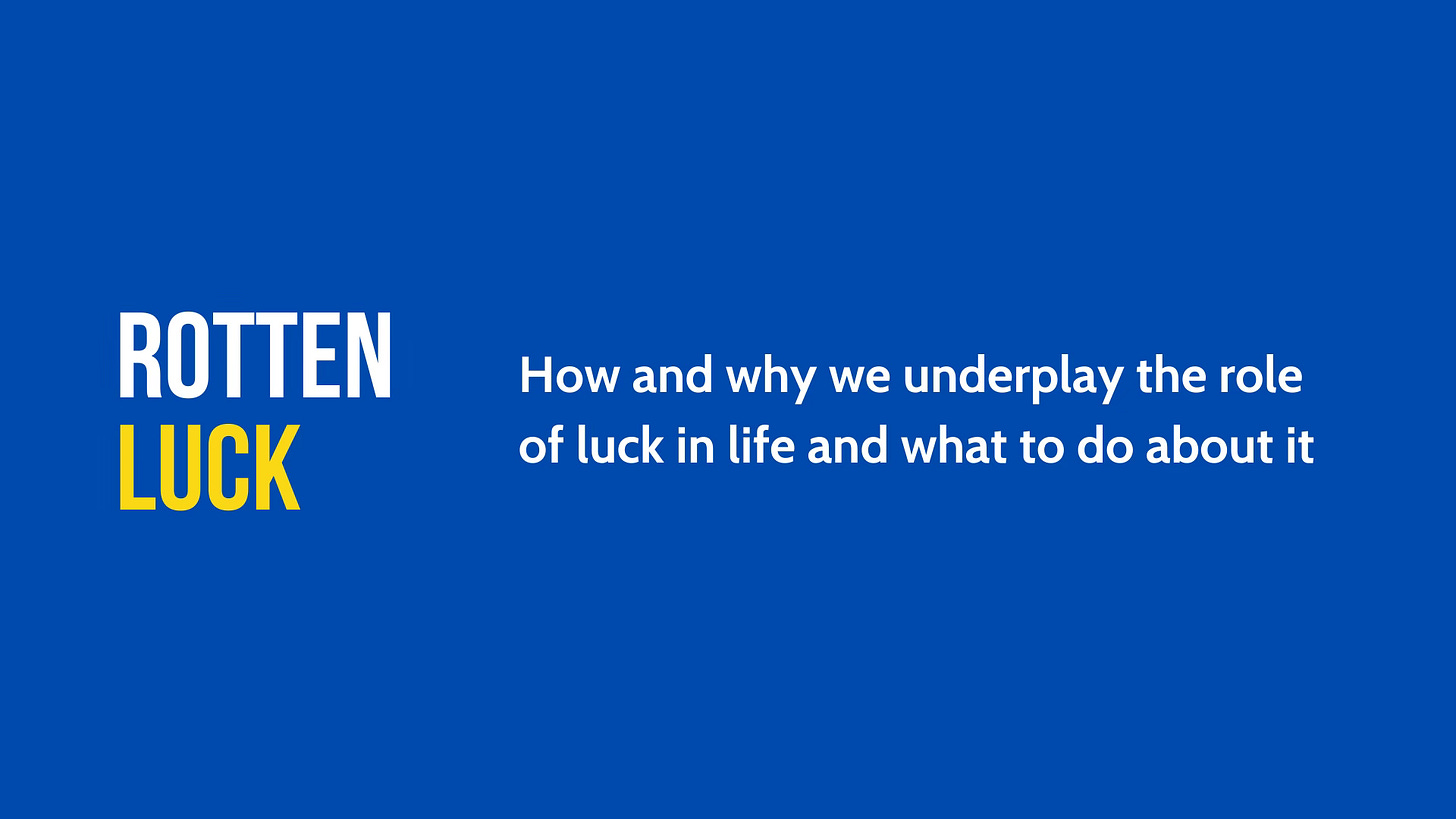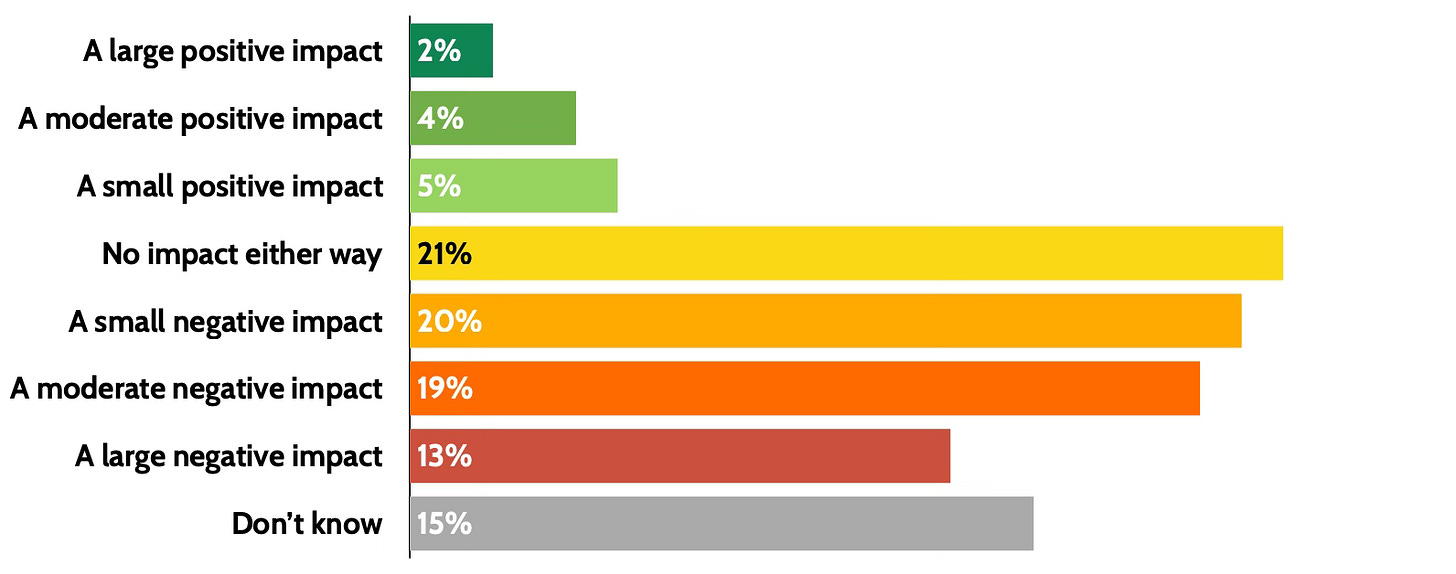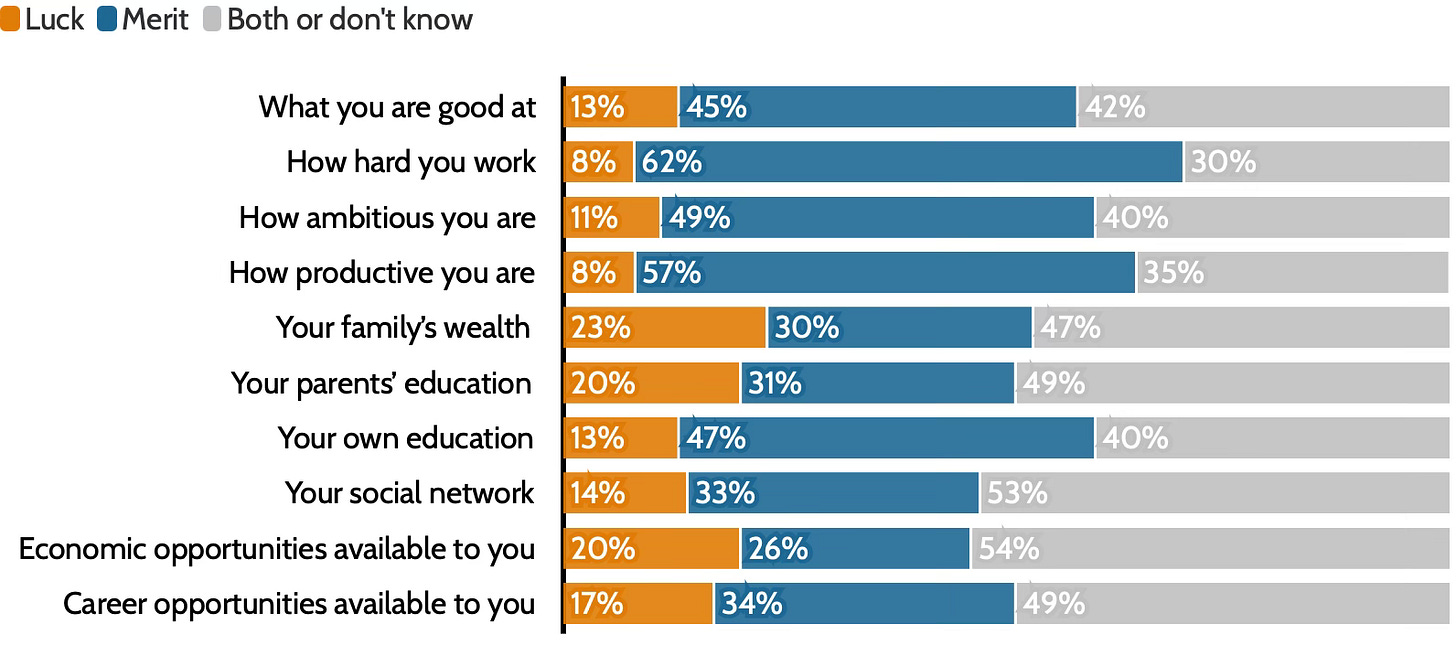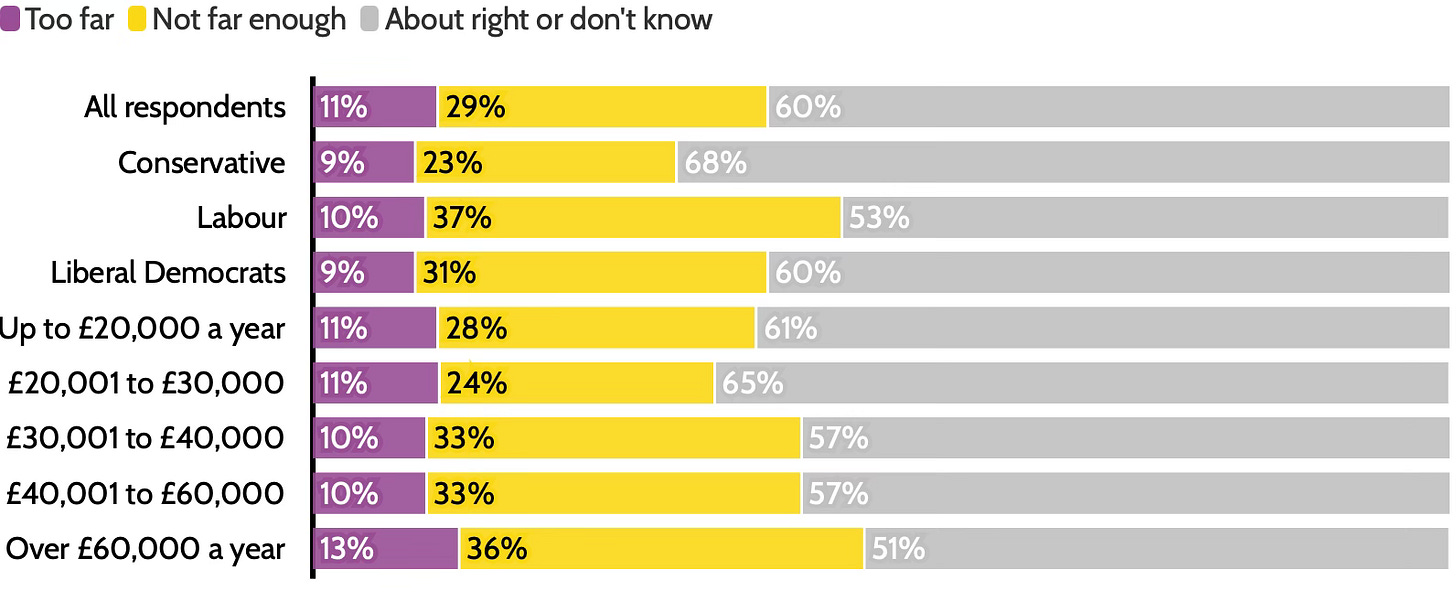Browse the report | Read and share our twitter/X thread
BACKGROUND
We have a narrow conception of how luck affects our life chances and outcomes, which means that we underplay the role of luck in life. This has real-world implications for how we think society should work, what aspects of society today are problematic and what solutions we are willing to support to solve those problems. We want to believe that people get what they deserve, and that merit plays a bigger role in deciding where people end up than external factors that people can’t control.
As a result, most people believe that hard work is key in deciding whether or not they will ‘get ahead in life’. Being lucky is seen as much less important, for two reasons. The first is that luck is normally defined in a very narrow sense of random chance events that might happen to us in the future. The second is that many people underestimate the impact of structural drivers of life chances, such as whether someone is born into a family with financial and/or social capital (and what talents someone is born with).
Our hypothesis is that most people don't think about these broader structural drivers in terms of luck, but that if they did, they might decide that these structural issues are more important than they thought, and that because they are so unevenly distributed throughout society, we should do more to even things up. We want to find out whether talking about structural issues in terms of luck is a useful way of persuading more people to support reforms that will tackle inequality and build a fairer society.
We've carried out some initial polling to explore what people think about the impact of luck on their and other people’s life chances and outcomes, how much they associate structural drivers with luck, whether they think society should do more to reduce the role of luck in life, and how these attitudes vary based on the characteristics of the respondent. Polling only gets you so far, especially for such a complex and nebulous topic, but we think it provides a useful starting point for thinking about more in-depth research into this important issue.
This report sets out our thinking about the philosophy of luck and why too much luck is unfair, how important luck really is in influencing our lives, how we can reduce the influence of luck on our lives, what people in the UK think about luck (with insights from our new opinion polling), how and why we think about luck in this way, and why the way we think about luck matters. This report is the first phase in a larger project; for the next phase we plan to carry out some qualitative and framing research on how to shift mindsets and attitudes around luck.
This email presents our new polling evidence on public attitudes to luck. The full report is available online at https://fairnessfoundation.com/rotten-luck.
As well as looking at the polling data, the report considers:
Concepts: The philosophy of luck and why too much luck is unfair
Reality: How important luck really is in influencing our lives
Policies: How we can reduce the influence of luck on our lives
Attitudes: What we think about luck
Mindsets: How and why we think about luck in this way
Impacts: Why the way we think about luck matters
PUBLIC ATTITUDES TO LUCK
What do people think about the impact of luck on their and other people’s life chances and outcomes? And do they think about luck in its narrower sense (e.g. falling under a bus or winning the lottery), or do they have a broader definition of luck that encompasses factors outside people’s control, such as the circumstances into which someone is born? How do these attitudes vary based on the issues under consideration and based on the characteristics of the respondent?
To find out, we commissioned Opinium to run a nationally representative UK poll of 2,060 adults from 24-26 January 2024, weighted to standard demographic criteria and political criteria.
Key findings
Most people think they have been affected by bad luck; only one in ten say they have had good luck
More people say that luck has had a small impact on their life than a large impact
People think physical health and education are within their control, but not mental health
People associate talent, education, family wealth and productivity more with merit than with luck
A large majority of people think we need to do more to reduce the impact of luck on people’s lives
Key statistics
People aged 50-64 are among the most likely to say that they have suffered from bad luck (59%), despite that group having benefited from stable employment and strong economic growth and asset price inflation over their lifetimes. Older people are also the least likely to think that luck has had a positive impact on their lives (6% of over 65s, and 10% of those aged 50-64).
People on low incomes (8%) and 2019 Conservative voters (10%) are the next least likely to say they have benefited from good luck (compared to 14% of high earners and 15% of Labour voters).
Half of people (53%) think bad luck outweighs good luck in shaping their personal circumstances, while only one in ten (11%) say good luck is more important. More people say luck has had a small impact on their life (46%) than say it has had a large impact (39%).
More think that physical health (39%) and educational outcomes (36%) are within people’s control than outside factors, but more think that mental health outcomes are outside people’s control (29%) than within (21%).
33% of people in higher-income households think that salary levels are more influenced by factors within people’s control, compared to 20% of people in lower-income households. By contrast, people across the income spectrum believe that levels of wealth accumulation are mostly influenced by factors outside people’s control.
People are more likely to associate issues like their own talent (what you are good at) (45%), education (47%), family wealth (30%) and productivity (56%) with merit than with luck.
More than twice as many people think we need to do more to reduce the impact of luck on people’s lives (29%) than think that we have gone too far already in doing this (11%).
You can read the full report here, and there is an online version of this summary of the polling here.
Please share this with your colleagues and networks (you can also share a twitter/X thread if you prefer), and do let me know if you have any feedback on the report (including ideas for other issues that we could look at in a similar way).
FINAL CALL FOR EVENTS THIS WEEK
This Time No Mistakes: How to Remake Britain – with Will Hutton
Monday 22 April 2024, 6.30pm to 7.45pm, Bush House (central London) and online
With Will Hutton, Helena Kennedy KC, and Professor Bobby Duffy
In his new book, This Time No Mistakes: How to Remake Britain, political economist and Observer columnist Will Hutton analyses how the left and right have gone wrong over the course of the last century. He argues that two great traditions, ethical socialism and progressive liberalism, can be brought together to offer a different way forward and help shape a better Britain.
How workers can reclaim the work ethic – with Elizabeth Anderson
Thursday 25 April 2024, 1pm to 2pm, Zoom
With Elizabeth Anderson, Sohrab Ahmari, Bethan Staton, Stuart White and Will Snell
In her latest book, Hijacked: How neoliberalism turned the work ethic against the workers, US political philosopher Elizabeth Anderson argues that the 17th century concept of the Protestant work ethic has been perverted, and is now used to justify policies that promote the wealth and power of the richest in society, at workers’ expense.












